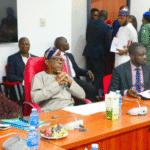Former Nigerian President Goodluck Ebele Jonathan, on Saturday, opened up on the political crisis he embarked upon following the prolonged illness of the late President Umaru Musa Yar’Adua.
Speaking during an interview with the Rainbow Book Club, Jonathan revealed that he was prepared to die inside the presidential villa rather than abandon his position during the constitutional crisis that rocked the nation.
According to Jonathan, Yar’Adua did sign a letter transferring power to him, but the document was withheld from the National Assembly by a close aide whose identity he did not disclose.
Yar’Adua had allegedly travelled abroad for medical treatment in late 2009 without formally notifying the legislature or handing over power to Jonathan as required by law.
The development plunged Nigeria into a serious political and constitutional crisis, sparking concerns over a leadership vacuum.
Jonathan, who was vice president at the time, said the country faced one of its tensest periods, marked by religious and regional divisions.
“The country was tense. Under this north-south divide, the Christian Muslim divide, it was really tense. Every day I was hearing about a coup,” he said.
According to him, there was an unwritten understanding for the north to hold power for eight years after President Olusegun Obasanjo, a southerner, completed his tenure.
“But the health issue came up, and that was the problem. And that is why even to allow me to act was an issue,” he added.
Jonathan said that although he was able to carry out some duties as vice president, the absence of formal transmission of power meant he could not act as commander in chief.
“The president of Nigeria has two main responsibilities. First, you are the chief executive, like a prime minister, who the vice president can assume..
“But there was no commander in chief, and there’s nothing like acting commander in chief. You are either a commander in chief or not”, he said.
He said this power vacuum created uncertainty and led the national assembly to invoke the doctrine of necessity to formally empower him to act as president.
Recalling the pressure he faced, Jonathan said some of his friends urged him to vacate the villa for safety reasons due to fear of assassination.
“I remember one day, I was still vice president, they had not even moved the doctrine of necessity then and some of my friends came and said, ‘No, you don’t have to sleep here. You have to come and sleep in my guest house..
“I said, ‘No.’ I will stay in the state house. If anybody wants to kill me, it’s better you kill me in the state house so Nigerians will know that they assassinated me in the state house.”
“They know I have not committed any offence. If I go and stay in your guest house and people kill me there, they will now say Indian girls brought apples to kill me. And I wouldn’t want that kind of story”, he stated.
The period remains one of the most defining moments in Nigeria’s democratic journey.
Jonathan was eventually made acting president in February 2010 through the doctrine of necessity and later became president after Yar’Adua’s death in May of the same year.



